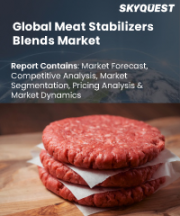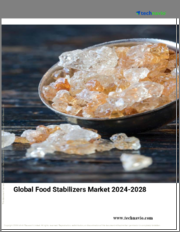
|
시장보고서
상품코드
1621891
육류 안정제 시장 성장 기회, 성장 촉진요인, 산업 동향 분석 및 예측(2024-2032년)Meat Stabilizer Market Opportunity, Growth Drivers, Industry Trend Analysis, and Forecast 2024-2032 |
||||||
세계 육류 안정제 시장은 2023년 29억 달러로 평가되었고, 2024-2032년간 연평균 5.3% 성장할 것으로 예상됩니다.
이 시장은 특히 가공육, 생육, 조리식품 등 다양한 부문에서 괄목할 만한 성장세를 보이고 있습니다. 가공육 부문은 편리하고 품질 좋은 식품에 대한 소비자 수요 증가에 힘입어 선두를 달리고 있습니다. 건강 지향적 식품 트렌드가 확산됨에 따라 식감, 보존성, 보습을 향상시키는 안정제에 대한 수요가 증가하고 있습니다. 소비자들은 천연 성분을 사용한 클린 라벨 제품을 선택하는 경향이 증가하고 있으며, 제조업체들은 제품 개선에 힘쓰고 있습니다.
이러한 변화는 육류 안정제 산업의 지속적인 성장을 뒷받침하고 있으며, 앞으로도 수요를 견인할 가능성이 높습니다. 천연 안정제가 인기를 얻고 있는 반면, 비용 효율성이 높은 합성 안정제가 선호되는 경우가 많습니다. 이러한 합성 대안은 일반적으로 생산 비용이 낮기 때문에 소비자 선호도와 수익성을 일치시켜야 하는 육류 생산업체들에게 어필할 수 있습니다. 그 결과, 많은 기업들이 제품에 합성 안정제를 계속 사용하고 있습니다.
용도별로는 가공육 부문이 2032년까지 20억 9,000만 달러에 달할 것으로 예상되며, CAGR은 5.3%를 나타낼 것으로 예상됩니다. 이 부문은 육류 안정제 시장에서 큰 비중을 차지하고 있으며, 이는 주로 편리한 식사 솔루션에 대한 수요 증가에 기인합니다. 안정제는 육류 가공품의 풍미, 식감 및 보존성을 향상시키는 데 필수적이며, 생산에 중요한 역할을 합니다. 라이프스타일이 점점 더 바빠지면서 소비자들은 빠르고 편리한 식사 옵션을 적극적으로 찾고 있습니다.
| 시장 범위 | |
|---|---|
| 시작 연도 | 2023년 |
| 예측 연도 | 2024년-2032년 |
| 시작 금액 | 2.9억 달러 |
| 예상 금액 | 4.6억 달러 |
| CAGR | 5.3% |
북미 육류 안정제 시장은 연평균 5.4% 성장하여 2032년 14억 1,000만 달러 규모에 이를 것으로 예상됩니다. 이러한 성장은 이 지역의 첨단 식품 가공 능력과 간편식에 대한 선호도 증가에 기인한 것으로 분석됩니다. 북미 소비자들은 즉석조리육과 가공육에 대한 선호도가 높아지면서 식감, 풍미, 보존성을 향상시키는 안정제에 대한 요구가 증가하고 있습니다. 또한, 엄격한 식품 안전 규정으로 인해 제조업체는 제품의 높은 품질과 산업 표준 준수를 유지하기 위해 효과적인 안정제를 도입해야 합니다.
목차
제1장 조사 방법과 조사 범위
제2장 주요 요약
제3장 산업 인사이트
- 생태계 분석
- 밸류체인
- 주요 제조업체
- 시장 참여 루트
- 주요 유통업체
- 신규 유통 채널
- 산업 전체 이익률
- 산업에 대한 영향요인
- 성장 촉진요인
- 가공식품과 컨비니언스 후드 수요 증가
- 건강지향 증가와 클린 라벨 상품에의 선호도 증가
- 레디밀(Ready Meal) 부문 확대
- 시장이 해결해야 할 과제
- 대체 보존료나 안정제와의 경쟁
- 합성 재료에 비해 천연 재료는 고비용
- 시장 기회
- 새로운 시장/용도
- 성장 가능성 분석
- 성장 촉진요인
- 원료 상황
- 제조 동향
- 기술 진화
- 사스테이나불 제조
- 그린 프랙티스
- 탈탄소화
- 새로운 재료
- 원료 가격 동향(달러/톤)
- 제조 동향
- 규제와 시장에 대한 영향
- Porter's Five Forces 분석
- PESTEL 분석
제4장 경쟁 구도
- 기업 점유율 분석
- 경쟁 포지셔닝 매트릭스
- 전략 전망 매트릭스
제5장 시장 규모와 예측 : 제품 유형별, 2021-2032년
- 주요 동향
- 천연 안정제
- 식물 유래
- 동물 유래
- 합성 안정제
- 인산염
- 하이드로콜로이드
- 기타
제6장 시장 규모와 예측 : 용도별, 2021-2032년
- 주요 동향
- 가공육
- 소시지
- 고기 스낵
- 냉동 육류 가공품
- 조리가 끝난육·관
- 핫도그
- 생육
- 소고기
- 가금육
- 돼지고기
- 레디밀(Ready Meal)
- 기타
제7장 시장 규모와 예측 : 지역별, 2021-2032년
- 주요 동향
- 북미
- 미국
- 캐나다
- 유럽
- 독일
- 영국
- 프랑스
- 이탈리아
- 스페인
- 기타 유럽
- 아시아태평양
- 중국
- 인도
- 일본
- 한국
- 호주
- 기타 아시아태평양
- 라틴아메리카
- 브라질
- 멕시코
- 아르헨티나
- 기타 라틴아메리카
- 중동 및 아프리카
- 사우디아라비아
- 아랍에미리트
- 남아프리카공화국
- 기타 중동 및 아프리카
제8장 기업 개요
- Cargill
- Incorporated
- Meat Cracks Technologie GmbH
- Amesi Group
- Tate & Lyle
- FSL
- Caragum International
- Ingredion
- Ashland Inc.
- Hydrosol GmbH & Co. KG
The Global Meat Stabilizer Market was valued at USD 2.9 billion in 2023 and is expected to grow at a CAGR of 5.3% between 2024 and 2032. The market is witnessing significant expansion across various segments, particularly in processed meat, fresh meat, and convenience foods. The processed meat sector is the frontrunner, driven by an increasing consumer demand for convenient and high-quality food options. As health-conscious eating trends gain traction, there is a rising demand for stabilizers that improve texture, shelf life, and moisture retention. Consumers increasingly opt for clean-label products made with natural ingredients, prompting manufacturers to reformulate their offerings.
This shift supports consistent growth in the meat stabilizer industry and is likely to continue driving demand in the years ahead. While natural stabilizers have gained popularity, synthetic alternatives are often preferred due to their cost-effectiveness. These synthetic options typically entail lower production expenses, appealing to meat producers who need to align consumer preferences with profitability. As a result, many companies continue to use synthetic stabilizers in their products.
In the application landscape, the processed meat segment is projected to reach USD 2.09 billion by 2032, with a CAGR of 5.3%. This segment commands a substantial share of the meat stabilizer market, primarily fueled by the growing demand for convenient meal solutions. Stabilizers are essential in enhancing the flavor, texture, and shelf life of processed meat products, thereby playing a critical role in their production. As lifestyles become increasingly hectic, consumers actively seek quick and convenient meal options.
| Market Scope | |
|---|---|
| Start Year | 2023 |
| Forecast Year | 2024-2032 |
| Start Value | $2.9 Billion |
| Forecast Value | $4.6 Billion |
| CAGR | 5.3% |
North America meat stabilizer market is anticipated to grow at a CAGR of 5.4%, with a projected value of USD 1.41 billion by 2032. This growth is largely due to the region's advanced food processing capabilities and a rising preference for convenience foods. North American consumers are progressively leaning towards ready-to-eat and processed meat items, which drives the need for stabilizers that enhance texture, flavor, and shelf life. Moreover, stringent food safety regulations compel manufacturers to implement effective stabilizers to maintain high product quality and compliance with industry standards.
Table of Contents
Chapter 1 Methodology & Scope
- 1.1 Market scope & definition
- 1.2 Base estimates & calculations
- 1.3 Forecast calculation
- 1.4 Data sources
- 1.4.1 Primary
- 1.4.2 Data mining sources
- 1.4.2.1 Paid sources
- 1.4.2.2 Public sources
Chapter 2 Executive Summary
- 2.1 Industry 360° synopsis
Chapter 3 Industry Insights
- 3.1 Industry ecosystem analysis
- 3.1.1 Value chain
- 3.1.2 Key manufacturers
- 3.1.3 Go to market routes
- 3.1.4 Key distributors
- 3.1.4.1 New distribution channels
- 3.1.5 Profit margins across the industry
- 3.2 Industry impact forces
- 3.2.1 Growth drivers
- 3.2.1.1 Increasing demand for processed and convenience foods
- 3.2.1.2 Rising health consciousness and preference for clean-label products
- 3.2.1.3 Expansion of the ready-to-eat meals sector
- 3.2.2 Market challenges
- 3.2.2.1 Competition from alternative preservatives and stabilizers
- 3.2.2.2 High cost of natural ingredients compared to synthetic options
- 3.2.3 Market opportunities
- 3.2.3.1 New markets/applications
- 3.2.3.2 Growth potential analysis
- 3.2.1 Growth drivers
- 3.3 Raw material landscape
- 3.3.1 Manufacturing trends
- 3.3.1.1 Technology evolution
- 3.3.1.2 Sustainable manufacturing
- 3.3.1.2.1 Green practices
- 3.3.1.2.2 Decarbonization
- 3.3.2 New raw materials
- 3.3.3 Raw material pricing trends (USD/Tons)
- 3.3.3.1 North America
- 3.3.3.2 Europe
- 3.3.3.3 Asia Pacific
- 3.3.3.4 Latin America
- 3.3.3.5 MEA
- 3.3.1 Manufacturing trends
- 3.4 Regulations & market impact
- 3.5 Porter's analysis
- 3.6 PESTEL analysis
Chapter 4 Competitive Landscape, 2023
- 4.1 Company market share analysis
- 4.2 Competitive positioning matrix
- 4.3 Strategic outlook matrix
Chapter 5 Market Size and Forecast, By Product Type, 2021-2032 (USD Billion, Tons)
- 5.1 Key trends
- 5.2 Natural stabilizers
- 5.2.1 Plant-based
- 5.2.2 Animal-based
- 5.3 Synthetic stabilizers
- 5.3.1 Phosphates
- 5.3.2 Hydrocolloids
- 5.3.3 Others
Chapter 6 Market Size and Forecast, By Application, 2021-2032 (USD Billion, Tons)
- 6.1 Key trends
- 6.2 Processed meat
- 6.2.1 Sausages
- 6.2.2 Meat snacks
- 6.2.3 Frozen processed meat products
- 6.2.4 Cooked and canned meats
- 6.2.5 Hot dogs
- 6.3 Fresh meat
- 6.3.1 Beef
- 6.3.2 Poultry
- 6.3.3 Pork
- 6.4 Ready-to-eat meals
- 6.5 Others
Chapter 7 Market Size and Forecast, By Region, 2021-2032 (USD Billion, Tons)
- 7.1 Key trends
- 7.2 North America
- 7.2.1 U.S.
- 7.2.2 Canada
- 7.3 Europe
- 7.3.1 Germany
- 7.3.2 UK
- 7.3.3 France
- 7.3.4 Italy
- 7.3.5 Spain
- 7.3.6 Rest of Europe
- 7.4 Asia Pacific
- 7.4.1 China
- 7.4.2 India
- 7.4.3 Japan
- 7.4.4 South Korea
- 7.4.5 Australia
- 7.4.6 Rest of Asia Pacific
- 7.5 Latin America
- 7.5.1 Brazil
- 7.5.2 Mexico
- 7.5.3 Argentina
- 7.5.4 Rest of Latin America
- 7.6 MEA
- 7.6.1 Saudi Arabia
- 7.6.2 UAE
- 7.6.3 South Africa
- 7.6.4 Rest of MEA
Chapter 8 Company Profiles
- 8.1 Cargill
- 8.2 Incorporated
- 8.3 Meat Cracks Technologie GmbH
- 8.4 Amesi Group
- 8.5 Tate & Lyle
- 8.6 FSL
- 8.7 Caragum International
- 8.8 Ingredion
- 8.9 Ashland Inc.
- 8.10 Hydrosol GmbH & Co. KG















